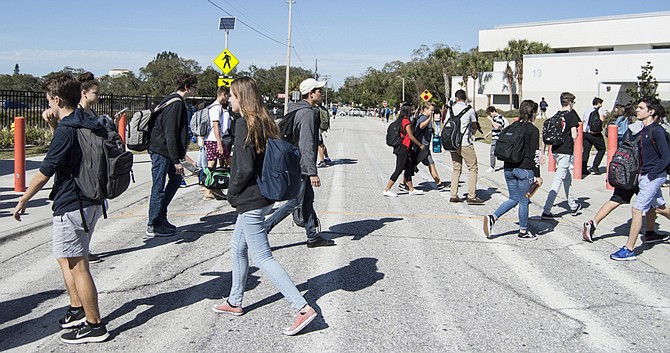- November 22, 2024
-
-
Loading

Loading

Closing School Avenue to pedestrians during school hours is opposed not just by the Alta Vista Neighborhood Association but also by the Arlington Park Neighborhood Association.
In February 2017, six of seven City Commission candidates opposed shutting School Avenue down to walkers. Their reasons were to protect the pedestrian grid and to reduce car traffic.
If School Avenue is forbidden to walkers, they will have to walk an extra half-mile to go the short distance between School/Hatton and School/Bahia Vista. Walks to nearby places such as the Midtown Plaza may become impractical.
It was the School Board that expanded the high school to both sides of School Avenue. If the School Board now decides it has a problem with it, it is only fair that they should bear the costs of fixing it. As to the alleged “problem,” when we asked school officials what serious incidents had occurred due to School Avenue pedestrians, they said they had not heard of any in the last 20 years.
Since 1989, the School Board has pressed for a complete street vacation so it could shut it down completely to all traffic. And recently, in February 2017, School Board Member Shirley Brown, in an email sent to the City Commission, wrote: “It was agreed that School Ave. would be closed during school hours and I believe there was an agreement to actually close School Ave permanently in the near future.” Two days later, City Engineer Alex Davis-Shaw emailed back, “……..there isn’t such an agreement.”
None of this means that anyone is indifferent to school security.
Neighborhood residents proposed a solution to school officials last summer, a proposal unmentioned in the recent article. It is a fourth option besides a tunnel, an overpass, or road shutdown. This solution is low-cost, proven, and fair. On the east and west sides of School Avenue, the school is already almost completely fenced off or behind locked doors.
Complete fencing and pedestrian gates could be installed on each side. The gates could be monitored by video, staff, or student monitors. And/or, these gates could allow passage by magnetic stripe cards, RFID, QR codes, or other technologies. These badges could be used at all entrances, thereby magnifying security campus-wide. If this had been used at Parkland, many lives might have been saved already.
We all want to protect schoolchildren. But, we don’t have to shut down School Avenue.
Mike Lasché
Sarasota
You state in your editorial, "let's not let fear cloud our common sense. Treating schools like minimum security prisons is not the answer." I suppose your "common sense" would call for an end to airport security? Or courthouse security? How about White House and Capitol security?
A better answer according to your judgment is more focus on "mental health." Apparently it hasn't occurred to you that most or many of these perpetrators aren't mentally ill, but sociopaths. No amount of therapy is going to cure these types of sick individuals. Some will be smart enough to fly under the radar until it's too late. Others won't be detected.
Your solution is woefully inadequate. What you fail to understand is that an effective solution is going to be multi-faceted and it's going to be painful, including: enhanced security; severely limiting access to guns (apparently many of these shooters were "law-abiding citizens" until, of course, they weren't); social and cultural change to instill (or restore) an emphasis on virtue and the sanctity of human life, and strengthening the means for identifying and dealing with those who are prepared to commit their heinous acts.
Failure to address any one of the four points will result in continued futility and grief.
David Owen
Bloomfield Hills, MI (and Sarasota in the winter)
Your current article, How Do We Keep Our Kids Safe?, identifies the pitfall of yielding to a siege mentality. There are too many guns and too many crazy people, the reasoning goes, so let’s have more guns and guards. Anyone should be able to see where that strategy leads. Free citizens shouldn’t have to live in bunkers.
Your proposed solution, however, is equally unworkable. There is no law enforcement, mental health, or social services professional that has the clairvoyance or legal standing to predict which of our millions of emotionally troubled citizens should be denied a gun.
The rate of mental illness and domestic violence in the United States is the same as in other developed countries who don’t suffer our rates of murder by firearms, so there must be something else.
How about this: We have a catastrophic consumer product safety problem. We allow largely unfettered access to products that kill. Consider this: Too many people were getting killed on our roads, so we responded with stringent safety standards. We didn’t take away people’s right to buy and drive a car, but we did establish safeguards. Most of us agree to these regulations because they have reduced death on our roads dramatically.
Let’s treat guns like a dangerous consumer product. Require registration, background checks, better technology, manufacturer accountability for safety research and features, liability insurance, and other limits. No other product with such a lethal record enjoys such widespread access to American consumers.
And don’t roll out the tired trope that the Second Amendment doesn’t allow us to regulate guns. Every single constitutional right in America is counterbalanced by legislation that enforces responsible exercise of that right. We can promote responsible gun ownership, support hunting and sport shooting, keep homes that have guns safer for children, hold manufacturers and sellers responsible for improved product safety, and prohibit weapons with poor safety records or no demonstrable sporting or self-defense use. And at the same time respect our right to own firearms.
It’s a weight we all bear. The failure to act is a moral travesty.
M.D. Hicks, Ph.D
Retired psychologist
Osprey